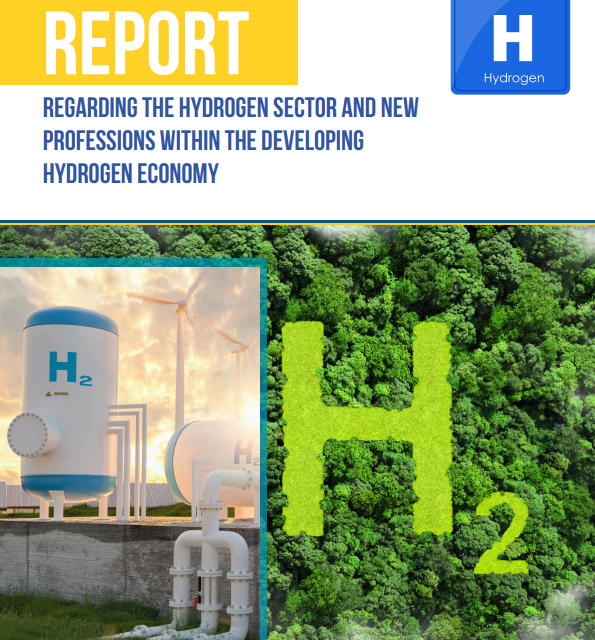In the context of the project Professions and competences in the hydrogen sector (Project no. 2023-1-PL-01-KA220-VET-000159821), we publish the report titled “Regarding the Hydrogen sector and new professions within the developing hydrogen economy”.
After a general overview of the hydrogen sector economy, the report delves into the hydrogen economies of several countries, highlighting their strategies, current statuses, and future plans.
- Netherlands
- The Netherlands is focusing on developing a comprehensive hydrogen value chain, from production to end-use applications. The country aims to become a leader in green hydrogen production, leveraging its existing natural gas infrastructure and North Sea wind energy potential.
- Spain
- Spain’s hydrogen strategy emphasizes the production of green hydrogen using its abundant renewable energy resources. The country is investing in large-scale electrolysis projects and aims to integrate hydrogen into its industrial and transportation sectors.
- Ireland
- Ireland is exploring the potential of green hydrogen as part of its broader renewable energy strategy. The country is focusing on pilot projects to demonstrate the feasibility of hydrogen in various applications, including transportation and power generation.
Hydrogen Value Chain
The report explores the hydrogen value chain which encompasses production, transmission, storage, and application across various sectors. Each stage involves different technologies, regulatory frameworks, and market conditions. The report provides an in-depth analysis of these stages, including:
- Production: Methods of hydrogen production range from electrolysis using renewable energy (green hydrogen) to natural gas reforming with carbon capture (blue hydrogen). The choice of production method significantly impacts CO2 emissions and production costs.
- Storage: Hydrogen can be stored in gaseous, liquid, and solid forms. The report examines various storage methods, such as underground storage in salt caverns and above-ground storage in pressurized tanks, each with its advantages and challenges.
- Transportation: Transporting hydrogen over long distances can be done via pipelines or maritime transport. The report discusses the technological readiness and cost implications of different transportation methods, including the need for dedicated hydrogen pipelines and retrofitting existing gas infrastructure.
Polish Hydrogen Strategy
Poland’s hydrogen strategy has been described. It serves as a case study within the report, illustrating the country’s efforts to integrate hydrogen into its energy system. The strategy aims to develop a hydrogen economy based on the Power-to-X model, increasing the use of renewable energy for hydrogen production and its application across various sectors.
Challenges and Recommendations
The report identifies several challenges facing the hydrogen economy, including:
- Regulatory and Financial Barriers: Establishing a stable regulatory environment and securing sufficient funding are critical for the hydrogen sector’s growth. The report suggests creating supportive policies and financial incentives to encourage investment.
- Technological Readiness: Advancements in hydrogen production, storage, and transportation technologies are essential. The report recommends investing in research and development to overcome technological barriers and achieve cost reductions.
- Infrastructure Development: Building the necessary infrastructure, such as hydrogen refueling stations and storage facilities, is crucial. The report emphasizes the importance of coordinated efforts between public and private sectors to develop comprehensive infrastructure networks.
New Professions in the Hydrogen Economy
As the document outlined, the transition to a hydrogen economy will create new job opportunities across various sectors. The report highlights emerging professions, including:
- Hydrogen Production Technicians: Specialists in operating and maintaining hydrogen production facilities.
- Hydrogen Infrastructure Engineers: Experts in designing and developing hydrogen storage and transportation infrastructure.
- Regulatory and Safety Advisors: Professionals focused on ensuring compliance with regulations and maintaining safety standards in hydrogen applications.
For a detailed analysis and further information, the full report can be accessed here.
Polish version here.



